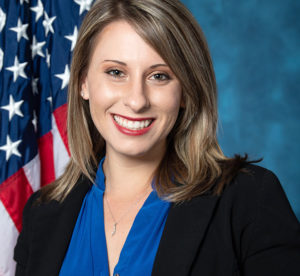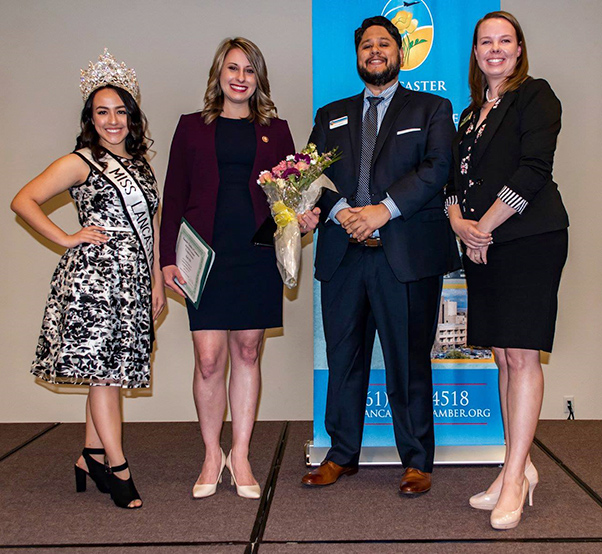Shared goals can unite, rather than divide, the Republican and Democratic parties if a common sense approach is taken when seeking solutions to issues challenging Americans at the national and local levels, according to U.S. Rep. Katie Hill, D-Agua Dulce.
Hill appeared before a crowd that packed the banquet room at the John P. Eliopulos Hellenic Center for a joint Lancaster/Palmdale Chambers of Commerce luncheon on April 17.
Chamber members, elected officials, business leaders and community residents listened intently as Hill, the guest speaker, discussed a variety of issues — everything from financial assistance for small businesses to legislation that facilitates the repayment of students’ college loans, to improved assistance for veterans needing homes, jobs and healthcare.
For many luncheon attendees, the event provided a first opportunity to see the Congresswoman in person.
Hill, who won California’s 25th Congressional District seat in the November election, said she decided to run for the elected position because she “valued public service” ever since she was a child, a perspective instilled by her parents. Her mother worked in the medical field as a nurse and her father in law enforcement as a police officer. Her father still serves, she noted.
Her career began as a policy advocate at a nonprofit organization called People Assisting the Homeless, commonly referred to as PATH. She eventually became executive director of that organization which grew from a grass roots effort to a statewide coalition, with the goal of ending homelessness, a situation faced by many veterans.
By tackling local problems at the national level, Hill said, “we are bringing common sense back to government.”
She described the Antelope Valley as “a community rooted in defense,” which guided her choice of committees in Congress. Hill serves on the House Armed Services Committee because she felt a “need to be in the room” when the budget was discussed. She serves on the House Science, Space and Technology Committee because the aerospace industry has the potential to bring thousands of future jobs to the Valley, lasting jobs that will result in prosperity, she noted.
Hill also serves on the House Committee on Oversight and Reform, where she pushes for transparency to hold the government accountable to the people. She also serves on 18 caucuses, including the Veterans Jobs Caucus; the California Aerospace Caucus; the Hunger Caucus; the Blue Collar Caucus; the LGBT Equality Caucus; the Mental Health Caucus; and the Pro Choice Caucus.
Hill conducted a question and answer session with the crowd.
Army veteran Dennis Anderson, a journalism professional and clinical social worker specializing in veterans’ mental health, asked Hill her stance on the Mission Act 101, a revision of the Mission Act signed into law in June 2018, intended to improve veterans’ access to healthcare through the Veterans’ Administration by eliminating a gap in care caused by funding deficits and other factors.
This year, Mission Act 101 was meant to strengthen the 2018 law and expand eligibility. Veterans Choice Act is used to take funds from conventional VA healthcare, a complex insurance program to cover health issues not provided for in the traditional VA setting.
“Taking funds from a federal agency puts a strain on the agency itself,” Hill said.

Another question from the crowd focused on the cost of healthcare.
“The cost of healthcare overall needs to be reduced,” Hill said. “Healthcare is such an expensive part of one’s budget.” She described the health insurance system as “fundamentally flawed. We have the Affordable Health Care Act in place. How can we stabilize that law? We have to look at short-term, medium-term and long-term solutions.”
Someone asked the Congresswoman what she is actively doing for homeless veterans, especially women veterans with children.
More money has been invested “in our district staffing and district resources,” Hill said. “We’re coming up with a wide range of options. Right now we’re working with local government to provide whatever resources we can.” For the long-term, Hill said, she and her staff are looking into the root causes of homelessness and addressing mental health issues. They are also trying to make more Veterans’ Administration resources available locally so veterans don’t have to travel to Los Angeles.
Someone else asked what resources are available for veterans returning home, to help them transition into civilian life.
Hill said she is working with U.S. Rep. Jackie Speier, D-San Francisco, and others on those issues. They continue pushing for funding programs that provide jobs and they’re also working on suicide prevention.
Another question from the crowd sought Hill’s stance on the Abortion Survivors Protection Act, which deals with the provision of healthcare for babies born alive during an attempted abortion.
“I experienced an unplanned pregnancy myself,” Hill said. “I come from a Pro-Life family.” Hill said she believes it’s not the role of government to be involved in those matters.
Other questions concentrated on government assistance for people who lost their homes during the mortgage meltdown and fully funding special education.
“We have to find ways of funding those programs,” Hill said, adding that one solution would be stopping the big tax breaks given to large corporations so they would pay their fair share of taxes.
Palmdale City Manager James Purtee said he’s been approached by developers who want to build but complain that they can’t get the funds. “Development won’t happen” Purtee said, until banks offer loans.
Hill said policies must be implemented to ensure banks will loan the needed funds.
One individual questioned the polarization occurring in this country, which divides citizens instead of promoting a united front, a condition that seems to exist among elected leaders.
Hill dispelled the image that the public sees or believes — that members of Congress constantly feud. She said the perceived conflict is “not necessarily the case.” She also denied the notion that representatives can’t be friends with “people across the aisle.” Though she’s a Democrat, she comes from a Republican family. She said when she ran for office, it was the first time her dad “voted for a Democrat.” She’s intent on eroding any barriers.











